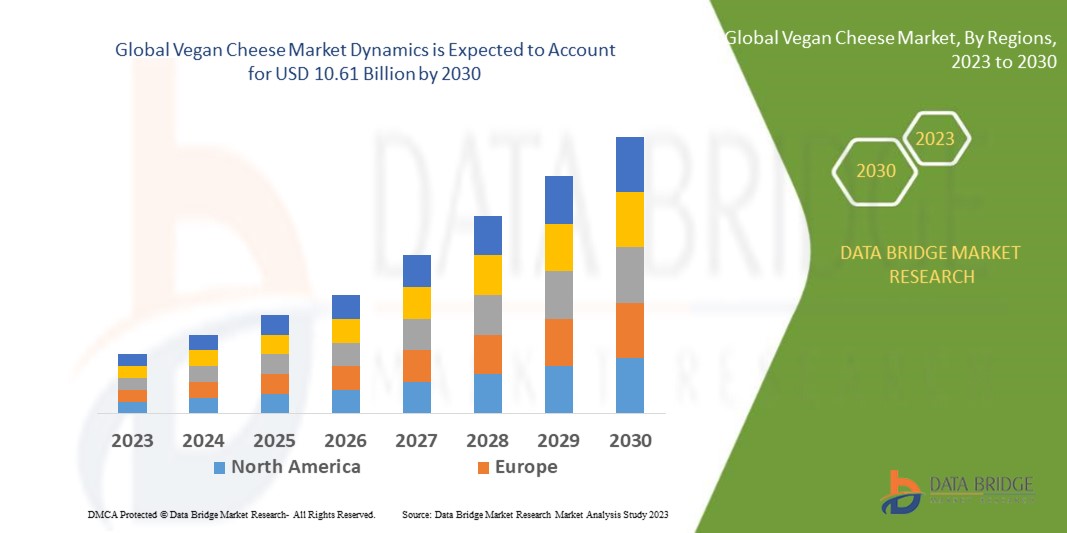Table of Contents
ToggleIntroduction
The vegan cheese market is booming as more consumers shift towards plant-based diets. Whether due to ethical, environmental, or health reasons, people are increasingly looking for dairy-free alternatives that don’t compromise on taste or texture. Vegan cheese, once a niche product, is now widely available in supermarkets, restaurants, and specialty stores worldwide.
With advancements in food technology, brands are continuously improving the quality of vegan cheese, making it melt, stretch, and taste more like traditional dairy cheese. The global vegan cheese market is expected to grow significantly over the next decade, driven by rising veganism, lactose intolerance, and increasing awareness of sustainability.
Market Overview
Vegan cheese is a dairy-free alternative made from plant-based ingredients like nuts, soy, coconut, and starches. Unlike dairy cheese, which relies on milk proteins for texture and flavor, vegan cheese uses a combination of plant proteins, oils, and fermentation techniques to achieve a similar taste and consistency.
Key characteristics of vegan cheese:
- Dairy-Free: No animal milk used
- Lactose-Free: Suitable for lactose-intolerant individuals
- Plant-Based Ingredients: Made from nuts, soy, or other plant sources
- Cholesterol-Free: Unlike dairy cheese, which contains cholesterol
Popular ingredients include cashews, almonds, coconut oil, soy protein, and nutritional yeast. These ingredients contribute to the creamy texture and cheesy flavor of plant-based cheese.
Key Market Trends
The vegan cheese industry is evolving rapidly, with several key trends shaping its growth:
Rising Veganism and Plant-Based Diet Adoption
The demand for plant-based food is at an all-time high. More consumers are choosing vegan or flexitarian diets, increasing the demand for dairy alternatives like vegan cheese.
Increasing Lactose Intolerance and Dairy Allergies
A growing number of people are lactose intolerant or have dairy allergies, pushing them towards plant-based alternatives. Vegan cheese offers a safe and delicious substitute for those who cannot consume dairy.
Sustainable and Ethical Consumer Choices
Sustainability is a key factor in consumer choices. Dairy farming has a significant environmental impact, from greenhouse gas emissions to deforestation. Vegan cheese production requires fewer resources, making it an eco-friendly option.
4. Market Segmentation
The vegan cheese market is diverse, with different products catering to various tastes and dietary needs.
4.1 By Product Type
- Mozzarella: Popular for pizzas and Italian dishes
- Cheddar: Used for sandwiches, burgers, and cooking
- Parmesan: Ideal for pasta and salads
- Cream Cheese: Spreadable option for bagels and dips
- Others: Gouda, blue cheese, feta, etc.
4.2 By Source
- Soy-Based: Rich in protein and widely used
- Almond-Based: Nutty flavor with a creamy texture
- Coconut-Based: High-fat content mimics dairy cheese
- Cashew-Based: Smooth texture and mild flavor
- Other Sources: Oat, rice, hemp-based cheeses
4.3 By Distribution Channel
- Supermarkets & Hypermarkets: Large retail stores offer various brands
- Online Stores: E-commerce platforms provide easy accessibility
- Specialty Stores: Health food stores with premium vegan cheese options
- Convenience Stores: Growing presence of vegan products in local stores
5. Regional Analysis
The vegan cheese market has seen significant growth worldwide, with demand increasing in various regions:
- North America: The largest market, driven by a strong vegan movement and health-conscious consumers.
- Europe: Countries like Germany, the UK, and France are leading in plant-based product adoption.
- Asia-Pacific: Rising awareness and lactose intolerance drive market growth.
- Latin America: Growing demand for dairy alternatives in urban areas.
- Middle East & Africa: Slow but steady adoption, with more vegan-friendly products entering the market.
Key Players in the Vegan Cheese Market
The vegan cheese industry is highly competitive, with several major companies leading innovation and production. Many brands are expanding their product lines to cater to the growing demand for dairy-free cheese alternatives.
Leading Vegan Cheese Brands
- Daiya Foods – One of the pioneers in vegan cheese, offering a variety of cheese styles, including shredded, sliced, and block cheese.
- Follow Your Heart – Known for its plant-based cheddar, mozzarella, and parmesan alternatives.
- Violife – A Greek company that specializes in coconut-based cheese alternatives.
- Miyoko’s Creamery – Focuses on artisan and organic vegan cheese made from cashews.
- Treeline Cheese – Uses cashew nuts to create fermented and aged cheese.
- Nush – UK-based brand offering almond-based cream cheese.
- Kite Hill – Specializes in almond milk-based cheese with a gourmet touch.
Market Strategies and Innovations
- Product Innovation: Many brands are improving textures and flavors to resemble dairy cheese closely.
- Collaborations with Restaurants: Vegan cheese brands are partnering with fast-food chains like Domino’s, Pizza Hut, and Burger King.
- Expansion in Retail Chains: Supermarkets are stocking more plant-based cheese products to meet consumer demand.
- Sustainability Efforts: Many companies are focusing on sustainable packaging and ethical sourcing.
Challenges in the Vegan Cheese Market
While the vegan cheese market is growing rapidly, it faces several challenges:
High Production Costs
Producing high-quality vegan cheese requires expensive ingredients and specialized processing methods. Nuts like cashews and almonds are costly, and fermentation techniques add to production expenses.
Taste and Texture Challenges
One of the biggest hurdles is replicating the melt, stretch, and taste of dairy cheese. While brands have made significant improvements, some consumers still find vegan cheese lacking in flavor and texture compared to traditional cheese.
Regulatory and Labeling Issues
Many countries have strict regulations on labeling plant-based products. Some dairy industry lobbyists argue that “cheese” should be reserved for dairy-based products, leading to restrictions on marketing vegan cheese under that name.
Opportunities for Growth
Despite challenges, there are significant growth opportunities in the vegan cheese market:
Technological Advancements in Food Science
New fermentation techniques using plant-based cultures are improving the taste and texture of vegan cheese, making it more appealing to a broader audience.
Expanding Consumer Base Beyond Vegans
While vegans are a primary target audience, many non-vegans are also adopting plant-based cheese due to health concerns, lactose intolerance, and environmental reasons.
Emerging Markets and Investment Opportunities
Countries in Asia, Latin America, and the Middle East are witnessing rising demand for vegan cheese. Investors are keen on funding plant-based startups, leading to rapid innovation and expansion.
Consumer Preferences and Buying Behavior
Understanding consumer behavior is crucial for market growth.
Factors Influencing Consumer Choices
- Health Benefits: Vegan cheese is often seen as a healthier alternative to dairy cheese.
- Ethical Concerns: Many consumers choose plant-based cheese to avoid animal cruelty.
- Sustainability: Eco-conscious buyers prefer products with a lower environmental footprint.
- Flavor and Texture: Consumers prioritize taste and melting properties when selecting vegan cheese.
Price Sensitivity and Willingness to Pay
Vegan cheese is often more expensive than dairy cheese, which can deter price-sensitive consumers. However, as production scales up, costs are expected to decrease, making vegan cheese more affordable.
Influence of Marketing and Branding
Brands that emphasize sustainability, ethical sourcing, and taste innovation are more successful in attracting customers. Social media marketing and influencer endorsements also play a significant role in consumer decision-making.
10. Sustainability and Environmental Impact
Vegan cheese production has a significantly lower environmental footprint compared to dairy cheese.
Reduced Carbon Footprint
Dairy farming is one of the largest contributors to greenhouse gas emissions. Plant-based cheese production requires less water, land, and energy, making it a more sustainable option.
Ethical Sourcing and Packaging Initiatives
Many vegan cheese brands focus on sustainable packaging, using biodegradable or recyclable materials. Ethical sourcing of ingredients, such as fair-trade cashews, is also becoming a priority.
Role of Vegan Cheese in Fighting Climate Change
Switching from dairy to plant-based cheese can help reduce deforestation, water wastage, and methane emissions from livestock farming. As climate concerns grow, more consumers are choosing vegan cheese as part of a sustainable diet.
Future Outlook of the Vegan Cheese Market
The future of the vegan cheese market looks promising, with increasing innovation and adoption.
Market Size Projections and Expected Growth Rates
The global vegan cheese market size was valued at USD 3.37 billion in 2023 and is projected to reach USD 12.49 billion by 2031, with a CAGR of 17.80% during the forecast period of 2024 to 2031.
Innovations in Flavor and Texture
Companies are investing in new techniques like precision fermentation and cultured plant-based proteins to enhance the flavor and texture of vegan cheese. Future products will likely offer a more authentic cheese experience.
Potential Disruptions and Emerging Trends
- Personalized Nutrition: Customized plant-based cheese options tailored to dietary needs.
- 3D Food Printing: Could revolutionize the texture and presentation of vegan cheese.
- Hybrid Products: Combining plant-based and lab-grown dairy proteins for improved taste and performance.
Conclusion
The vegan cheese market is experiencing rapid growth, driven by health-conscious consumers, sustainability concerns, and increasing lactose intolerance. Despite challenges like high costs and texture issues, technological advancements and growing consumer demand will continue to propel the market forward. As more brands innovate and expand, vegan cheese is set to become a mainstream product enjoyed by vegans and non-vegans alike.
Get more Detail: https://www.databridgemarketresearch.com/reports/global-vegan-cheese-market
Author: Deepika Jadhav
I have a passion for storytelling and a keen eye for detail, bringing over three years of diverse writing experience to various domains like Healthcare, Automobiles, Chemical, ICT, FMCG etc.

